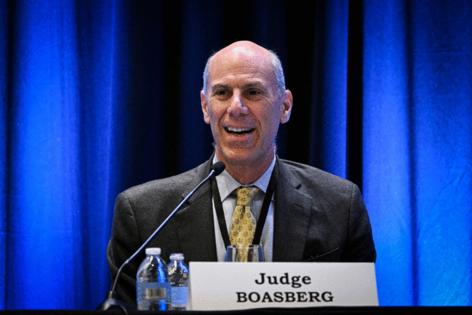Judge says he may order US to facilitate return of Venezuelans
Published in News & Features
A federal judge posed a new threat to President Donald Trump’s hard-line immigration policies, telling government lawyers he may order the U.S. to facilitate the return of alleged Venezuelan gang members who were deported to a notorious prison in El Salvador.
At a hearing Wednesday, U.S. District Judge James Boasberg said he is weighing whether he has the power to order the Trump administration to seek the return of more than 100 Venezuelans deported in March under a wartime law invoked only three times in U.S. history. He’s the first judge to consider the thorny question of how deportees can be brought back.
The hearing came amid several setbacks for Trump over his March 15 proclamation, which invoked the Alien Enemies Act of 1798 to deport alleged members of the Tren de Aragua gang. Last month, the Supreme Court ruled the men must get a “reasonable time” to challenge their deportation in court. Twelve days later, the Supreme Court intervened again, blocking use of the law to deport immigrants “until further order of this court.”
Many of the detainees say they aren’t gang members, and they contend Trump can’t deport them by invoking a law that previously had been used only in wartime. The Supreme Court hasn’t resolved whether Trump’s use of that law is legal. But federal judges in New York, Texas and Colorado have recently blocked its use.
Now, the American Civil Liberties Union is urging Boasberg to seek the return of the men even from the CECOT prison in El Savador, though the Trump administration argues they’re not in U.S. custody and only the president — not a judge — has the power to take such an action. The ACLU argues that the U.S. has “constructive custody” of the men and the ability to seek their return.
At the hearing, Boasberg pressed Justice Department lawyer Abhishek Kambli to concede that the deported men didn’t receive the due process that the Supreme Court says they deserve.
“They got some notice,” Kambli said. “I’m not sure of the precise contours of that. But it wasn’t the 12-hour notice they’re getting now.”
“You’ve essentially admitted that their rights were violated — then what’s the remedy?” Boasberg said.
The judge said he will order lawyers for the ACLU and the Justice Department to answer questions over the next week before he issues a decision.
The dispute involves a Trump proclamation, issued just hours before the deportations, that accused gang members of an “invasion” or “predatory incursion.” Trump said the gang conducts irregular warfare that benefits Venezuelan President Nicolas Maduro and that gang member are terrorists who use drug trafficking as a weapon against U.S. citizens.
Boasberg was the first federal judge to rule on the Alien Enemies Act. He issued an oral order on March 15 that the U.S. had to immediately halt the deportations. On that day, the U.S. flew three planeloads of suspected gang members to CECOT, including more than 130 under the Alien Enemies Act.
On April 16, Boasberg ruled there is “probable cause” to hold Trump administration officials in criminal contempt of court for “willful disregard” of his order. But Boasberg gave the administration a chance to comply with his earlier order — potentially by asserting that the U.S. retains control over the imprisoned men and ensuring that they can make their case to a federal judge in the US.
But the US has asked the Circuit Court of Appeals in the District of Columbia to overturn his contempt order. The appeals court hasn’t ruled yet.
The case is J.G.G. v. Trump, 25-cv-766, U.S. District Court, District of Columbia.
_____
©2025 Bloomberg L.P. Visit bloomberg.com. Distributed by Tribune Content Agency, LLC.







Comments